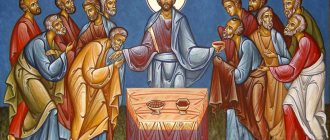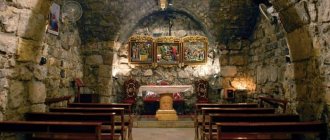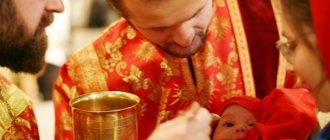A Word on Communion of the Holy Mysteries of Christ
The greatest shrine given by God to humanity is the Holy Communion of the Body and Blood of Christ. For the sake of communion, the main divine service of the Church is performed - the Liturgy. Vespers and Matins are auxiliary services; they only prepare the faithful for the Liturgy. The Church service of the Sacrament of Baptism is designed to introduce a person into the Church. In marriage, confession and unction, he is given grace-filled help on the path of salvation. Memorial services and prayer services are also necessary; they fulfill our desire for personal communication with the Lord for various private circumstances. But above all is the Liturgy. It contains all petitions, all our aspirations, both worldly - earthly, and spiritual - Heavenly. It contains prayers for the living and those already gone, the Gospel and church history. At this service, Heaven opens to us. “Oh, Divine, most holy, most heavenly, all-encompassing, centering Heaven and earth, Orthodox Liturgy!” — the holy righteous John of Kronstadt wrote in his diary. Its highest meaning is the transubstantiation of the Holy Gifts and communion. For the sake of this shrine, beautiful temples and majestic cathedrals were erected, wonderful chants were created, walls were decorated with frescoes, and iconostases were painted. Yes, the Liturgy can be celebrated both in the forest and in a quarry, but reverence for the Life-giving Mysteries of the Body and Blood of Christ encouraged and encourages our fellow believers to seek and find worthy forms and surroundings for the dwelling of this Shrine.
The attitude towards Communion reveals our spiritual state, our true Christianity. What spiritual life is, people understand differently. Some people find it in reading books, visiting the theater and art exhibitions. Some people see it in conversations over a cup of coffee about art, politics, or simply “pro-life.” A believer knows that the spiritualization of life depends on union with the absolute spirit - God. This includes prayer, reading the Gospel and the works of the holy fathers, and church service. But the main thing is communion - the most complete and closest union with God. He who eats My Flesh and drinks My Blood abides in Me, and I in him (John 6:56), the Savior promises.
At the last supper with his disciples, Jesus took bread and, having blessed it, broke it and, giving it to the disciples, said: Take, eat: this is My Body. And, taking the cup and giving thanks, he gave it to them and said: drink from it, all of you, for this is My Blood of the New Testament, which is shed for many for the remission of sins (Matthew 26:26-28). Do this in remembrance of Me (Luke 22:19). The first Christians did just that. They gathered together, remembered Christ, His words, the Sacrifice of the Cross and, of course, ate the blessed bread and wine. Later, when the service had already been compiled, many believers received communion at every Liturgy, sometimes, if possible, every day. “It is good and beneficial to commune and receive the holy Body and Blood of Christ every day, because Christ Himself clearly says: He who eats My Flesh and drinks My Blood has eternal life (John 6:54)” - we find in St. Basil the Great. Christians see the goal of life in acquiring a peaceful spirit in the soul, that is, in gathering one’s soul for the Kingdom of Heaven, in shaping one’s personality for eternal life. And true food and true drink for the soul, according to the Savior, is His Most Pure Body and Blood.
We reverently approach the Mystical Meal, having cleansed ourselves by repentance. Let no one dare to take communion with a bad conscience. For whoever eats and drinks unworthily eats and drinks condemnation for himself, without considering the Body of the Lord. That is why many of you are weak and sick, and many are dying (1 Cor. 11:29-30). The Apostle warns that unworthy communion can be harmful not only to the soul, but also to the body, even to the point of death. And therefore, “he knows only one time to begin the Mysteries and Communion, when his conscience is clear.” I remember a case where one person received communion without confession. And immediately I felt incredible fear. He hurried home, remembered that he had a bottle of vodka and wanted to drown out his fear with alcohol, but the fear was so great that the unfortunate man realized that alcohol would not help. Having somehow endured the night, he ran to church early in the morning, saw a man in the meadow mowing the grass, and began to take the scythe from him in order to commit suicide. But he failed and then he began to destroy everything that was nearby. He broke the glass of a car parked at the church gate with a brick. The watchman came out to hear the noise. He saw that the man was not himself, but not drunk, he did not smell of vodka, and called an ambulance. This man spent several months in a psychiatric hospital. And having left it, he came to church and brought repentance.
Communion is preceded not only by confession, but by several days of fasting. Fasting, as it were, takes us out of our usual busy life, gives us the opportunity to concentrate, to place the values of life in their true places. The prayer rule also prepares us for Holy Communion, without which we also cannot receive communion. The rule should not be mechanically read, but read carefully, delving into the words, so that our feelings resonate with the feelings of the saints who wrote these prayers.
There are believers who rarely receive communion, saying: I am unworthy. Of course, we are all unworthy, but this is why we receive communion, so that with God’s help we can overcome our unworthiness. Communion is a fire that consumes sinful habits. “There is fire, you unworthy ones burn.” Everyone prepares to their own extent for receiving the Mysteries of Christ, but one must certainly know what Communion is, and not just mindlessly do what is accepted.
Communion protects against demonic wiles. A demon once appeared to the Monk Macarius of Egypt and said: “If you had worthily accepted what you eat in your meetings, then we could not do anything to you.” If a person does not receive communion, then demons gain considerable power over him. Once a woman turned to St. John Chrysostom, the demon played such a joke on her that, looking at her, the husband saw not his wife, but a horse. The saint said that this happened to her because she had not received communion for six weeks. “It is a disaster for the soul not to partake of the Holy Mysteries for a long time; the soul begins to stink of passions, the strength of which increases the longer we do not communicate with Our Life-Giver (Righteous Saint John of Kronstadt).
Sometimes someone hesitates to take communion, waiting for some special mood. This is mistake. We cannot make spiritual life dependent on our random moods. The Kingdom of Heaven is taken by force, and those who use force take it away (Matthew 11:12) - said the Savior. In spiritual life, a strong and persistent will is especially needed. Communion strengthens our will. The usual rhythm of communion is once every three or four weeks. The Monk Seraphim of Sarov advised communion on all twelve and great holidays and on the day of the Angel. Of course, there are circumstances for more frequent communion. For example, during illness, in dangerous situations, pregnant women. Then the regime is discussed with the priest.
Anyone who, considering himself a believer, does not partake of Christ’s Body and Blood, according to the Savior, does not have eternal life in himself, he is dead to the Kingdom of Heaven. Truly, truly, I say to you, unless you eat the Flesh of the Son of Man and drink His Blood, you will not have life in you (John 6:53). The Kronstadt shepherd wrote: “If the world did not have the Most Pure Body and Blood of the Lord, it would not have the main good and true life, it would only have a ghost of life; would not have the gift of sanctification.”
“Taste and see that the Lord is good,” we hear at church services. Taste and see, that is, feel how good the Lord is. The communicant feels joy in being united with Christ. Joy of the soul, celebration, change in oneself, unusual freedom and lightness. Maybe not everyone feels this way from their first communion. But if a person is sincere in his desire to unite with the Lord, if he tried to prepare, and reverently accepted the Holy Gifts, then he will certainly receive “this thanksgiving for joy, health and gladness.”
How does the Sacrament of Communion take place in the Orthodox Church today?
The rules for preparing for the Sacrament are set out in the document “On the Participation of the Faithful in the Eucharist” adopted by the Bishops’ Conference on February 2-3, 2015.
For a summary of the document, read the article:
- On the participation of the faithful in the Eucharist
When can I take communion?
During the liturgy , in the morning. In large city churches it is served daily. There are also churches with small parishes, most often rural ones, where the liturgy is held only on Sundays. It is better to find out the time of its completion in person.
Divine Liturgy. Priest with the Holy Gifts
How to prepare and what time to arrive
Communion occurs towards the end of the liturgy, and its duration is usually about one and a half hours. However, it is not customary for Christians to come directly to Communion: the liturgy itself is a contact with the Last Supper of the Savior, a remembrance of it. That is why Christians, especially those who are going to receive communion, come to the very beginning of the service, trying not to be late, and pray especially reverently during it - for the sake of the upcoming Sacrament.
Fasting, prayer, confession
These are the three components of preparation for Communion.
Lenten work
Abstinence of the body is a necessary condition for preparing the soul for the Sacrament. Required:
- the so-called “preparatory fast”, or preparatory;
- The Eucharistic itself is just before the reception of the Holy Mysteries.
Preparatory fasting is abstinence from animal foods (meat, dairy, many also try not to eat fish). Spouses are also recommended to abstain from intimacy for a certain time. Finally, it is necessary to exclude entertainment and, if possible, attend religious services.
The duration of fasting is usually three days (if a believer approaches the Holy Mysteries often, for example, every 1-2 weeks, it can even be 1-2 days). Sometimes, if a person has not received communion for a long time or has serious sins, the preparation may last longer - in agreement with the priest.
Eucharistic fasting is a complete renunciation of food and drink from midnight until the Sacrament itself. The Church insists that those who are addicted to smoking should also abstain from tobacco. There are churches and monasteries where the liturgy (for example, the Presanctified Gifts) is served in the evening. Then the fast lasts at least 6 hours.
Prayers
It is usually customary to read the canons of repentance:
- Christ;
- Holy Mother of God;
- to your Guardian Angel.
The canons can be read one after another, or combined together. Sometimes pastors recommend that beginners, who are not accustomed to lengthy prayers, simply read one canon a day during the entire preparation for Communion. And some Orthodox Christians also zealously read the Akathist to the Sweetest Jesus.
Repentance
Finally, Communion is preceded by another Sacrament - confession . It is necessary, because, according to St. Simeon the New Theologian, “just as it is impossible for fire and water to be together in the same vessel, so it is impossible for both the most pure Body of Christ and the abomination of sin to be together in the same Christian .
It is better to find out in advance about when Confession takes place in a particular church. As a rule, it is performed during the evening service, based on the desirability of the presence of the communicant at the service on the eve of the Sacrament. If for a good reason (being busy at work, at home with small children, health conditions) a believer was unable to attend the service in the evening, he can also confess in the morning. However, this must be agreed upon with the priest, preferably in advance.
Follow up
These prayers are performed in the morning, usually before leaving the house. The sequence consists of:
- short prayers that have a very ancient origin, from the first centuries of the Church; in everyday life they are also called the “ordinary beginning”;
- several psalms, including the penitential 50th (Have mercy on me, O God...);
- The Canon, the refrains of which are taken from this Psalm;
- prayers composed by St. John Chrysostom, Basil the Great, Simeon the New Theologian, and other saints.
How to approach the Holy Chalice and other rules
When the Holy Gifts out of the altar,
“Come on with the fear of God and faith!”
At the same time, everyone bows to the ground. It is replaced by a waist bow when it is not customary to bow to the ground during divine services - for example, these are the days of Bright Week after Easter.
Then everyone who has the blessing proceeds to the Chalice. Usually:
- Children are the first to receive communion, as well as the weak and sick;
- then - men, however, in many parish churches this is not strictly observed;
- after them - women.
When approaching Communion, a Christian:
- folds his arms on his chest in a cross, the right hand should be on top;
- does not cross himself in front of the Chalice, so as not to accidentally touch it;
- clearly states his name given at Baptism;
- accepts the Holy Gifts into the mouth;
- after that he kisses the Cup.











